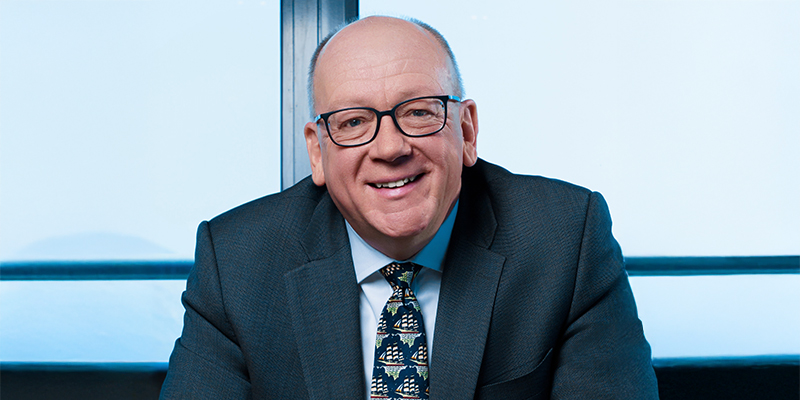
29 Apr Interview with Mr. Walter Simpson, Managing Director, CC Energy Development, Sultanate of Oman
JT: How does CCED’s strategic vision support Oman’s long-term hydrocarbon ambitions under Vision 2040, and what role does the company play in contributing to the nation’s energy security and economic growth?
Simpson: CCED entered Oman in 2007, taking over Blocks 3 and 4, which were undeveloped at the time. Other operators had not made discoveries, but we found oil and began production in 2010, with growth from exploration to production. Our production peaked at 45,000 barrels per day and now stands at around 30,000 barrels daily. This growth has been organic, driven by our dedicated team in Oman. Our strategy is built on three key pillars: being a low-cost operator, minimizing our environmental footprint, and being valued by the communities we serve. These pillars are interconnected, guiding our decisions and fueling our growth in advancing technical capabilities, developing people, and working with local vendors.
JT: CCED’S 150 million-barrel milestone is a remarkable achievement – could you share the key factors behind this success and how it reinforces CCED’s operational strategy in Oman?
Simpson: 150 million barrels from blocks that were undeveloped in 2007 is a remarkable achievement and it’s all thanks to our dedicated team. Without their expertise and our strong partnerships, we wouldn’t have reached this milestone. Our key partners in Blocks 3 and 4 are Tethys Oil (now owned by ROC Oil) with whom we are just beginning to build a relationship, and Mitsui, a long-term partner who’s been invaluable to our success. Having diverse ideas and experiences at the table strengthens our decisions, and we greatly value the external challenge that our partners bring, which drives our success.
JT: How does CCED approach exploration and production in Blocks 3 & 4, and what innovative technologies or strategies are you implementing to enhance operational efficiency and maximize output?
Simpson: We are producing from three horizons in the blocks: the Barik Sandstone Reservoir, and two fractured carbonates, Buah and Khufai. We are the first in Oman to produce from the Khufai, a pre-Cambrian formation around 600 million years old. Our production of 150 million barrels comes from these three horizons, though we hold significant acreage in both blocks. Recently, we acquired the world’s largest onshore nodal 3D seismic survey, a major investment in exploration. We’re now processing the data and plan to drill new wells later this year and next. We’ve also acquired two new exploration blocks, 74 and 38, where we’re in the first technical phase. We plan to shoot seismic in Block 38 by year-end and into next year. With our 2040 license for Blocks 3 and 4, we’re committed to Oman long-term. Additionally, our operations are deeply integrated with the community, with 92% Omanization and 88% of our senior leadership being Omani. As we move beyond peak production, our focus is on improving efficiency and exploring new opportunities. For example, our gas-to-power project uses associated gas to generate electricity for our facilities, reducing diesel reliance, cutting costs, and lowering greenhouse gas emissions by 70,000 tonnes annually.
JT: How does CCED balance operational efficiency with its sustainability commitments and what initiatives are in place to ensure responsible environmental practices?
Simpson: For us, environmental practices are not about balance; they’re integral to business success. Effective environmental management drives efficiency and reduces costs. By improving efficiency and reducing consumption, we lower greenhouse gas emissions and save money. We manage waste and water responsibly, using produced water for pressure support or disposing of it safely in subsurface reservoirs. We also practice waste segregation, recycling, and reducing usage, which helps cut costs. One initiative, suggested by our staff, involves using mobile reed beds for grey water. Previously, we transported grey water with diesel tankers over 100 km to Duqm’s sewage plant, but now we use 40-foot mobile reed bed containers at all our camps. This system cleans the water, allowing us to reuse it for irrigation and greening the site, reducing emissions, diesel costs, and the need for transport. We also compost food waste and use it along with grey water for irrigation, creating a greener environment for our staff while reducing waste and transport costs. For me, good environmental practice is simply good business.
JT: Can you elaborate on CCED’s efforts to support local talent development, particularly through the Musta’ed Program, and how these initiatives align with Oman’s broader capacity-building goals under Vision 2040?
Simpson: The Musta’ed Program is central to our social responsibility efforts. It helps Omani youth step outside their comfort zones, testing their abilities and fostering leadership skills. I believe it’s invaluable for personal development and teamwork. I was fortunate to sail around the world on a race yacht, which taught me a lot about leadership. This program challenges participants, helping them grow in ways that are crucial for leadership roles. Beyond this, we have other initiatives like Vendor Development, where we support smaller companies, and focus on maximizing local spending to boost in-country value. We also invest in developing our own staff’s technical and leadership skills, promoting from within whenever possible. Every year, we recruit top Omani graduates who excel globally with strong problem-solving and communication skills. This commitment to people, companies, and local products benefits us all – it’s more cost-effective, reduces emissions, and adds value to the community.
JT: Do you have any closing remarks for our readers who are considering visiting or investing in Oman?
Simpson: Oman is an excellent investment destination, offering stability and contract sanctity—key factors for investors. We highly value partnerships with international companies that bring fresh ideas, especially for technical challenges. For example, we’re currently seeking technology partners to help us utilize stranded gas at our facilities. With power plants at two sites and small gas amounts at others, we’re looking for innovative solutions to use it efficiently. While we’re strong in our field, we know we don’t have all the answers and are open to collaboration for mutual success.
